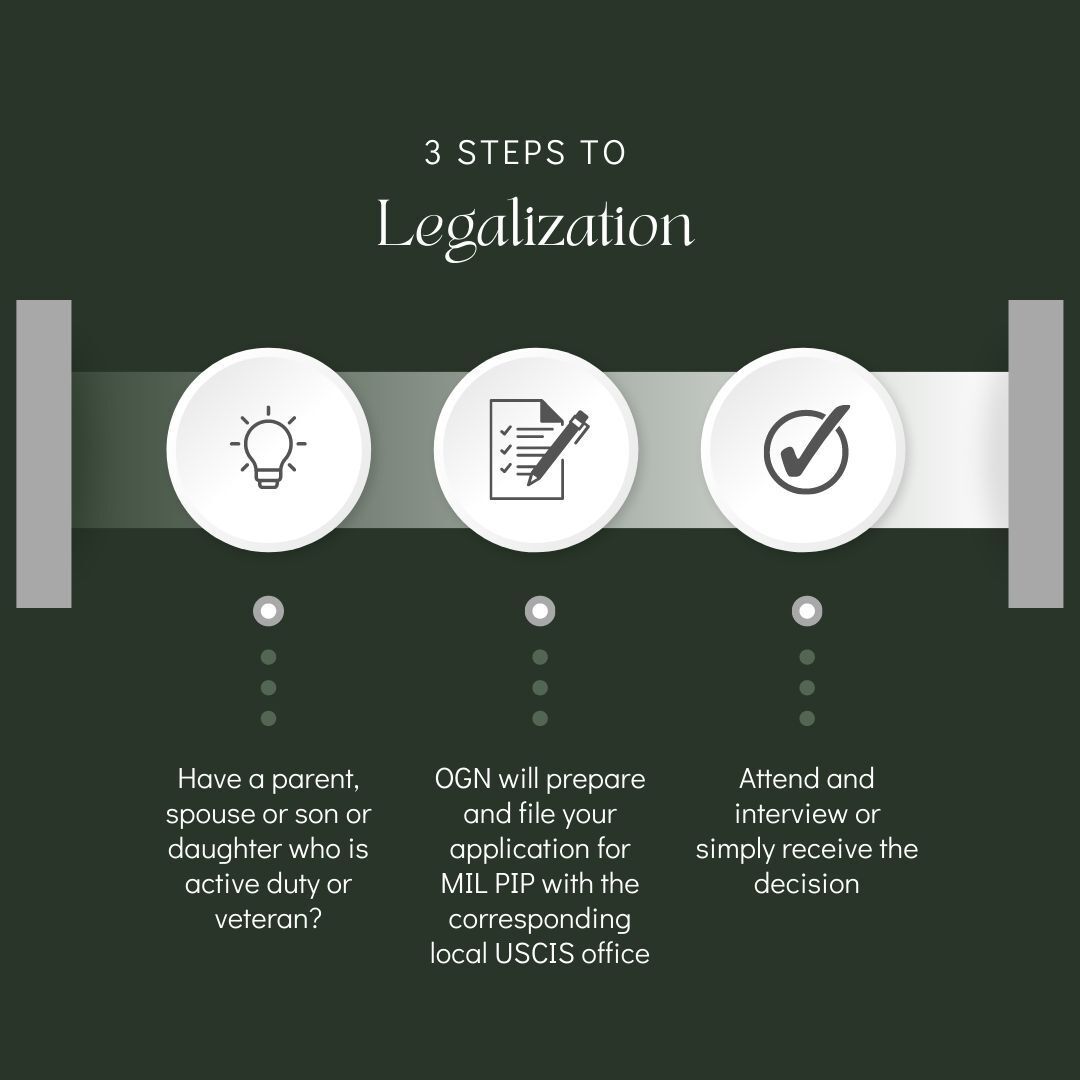WHAT IS MILITARY PAROLE IN PLACE
(MIL-PIP)?
WHAT IS MIL-PIP?
Military Parole in Place (MIL-PIP) is a priceless immigration benefit reserved for eligible, undocumented family members of past and present servicemembers of the U.S. Armed Forces which provides temporary legalization and will lead to permanent legalization for the undocumented, law-abiding family members of military personnel. In practice, this usually means parents, spouses, or children of the servicemember or veteran.
WHO QUALIFIES FOR MIL-PIP?
A MIL-PIP sponsor can be a member of the U.S. Armed Forces on active duty; a reservist; a member of the Individual Ready Reserve; in the National Guard; or a veteran of the U.S. Armed Forces.
OUR GRATEFUL NATION: GUIDING YOU ALONG YOUR MIL-PIP JOURNEY
HOW DOES MIL-PIP WORK?
MIL-PIP applications are submitted to U.S. Citizenship & Immigration Services (USCIS) and granted on a case-by-case basis, in one year increments. Once approved, MIL-PIP is a temporary form of legalization renewable on a yearly basis.
MIL-PIP recipients are eligible for an employment authorization document (EAD) which (when issued) is accompanied
by a bona fide Social Security Number (SSN). Many recipients of MIL-PIP are also eligible for adjustment of status (AOS, or “Green Card”), which constitutes full lawful permanent residency (LPR).
If the military sponsor is under 21, the family member must either find another eligible sponsor, or wait until the military servicemember turns 21, to apply for AOS. However, the family member is still eligible for yearly parole in place.
HOW DID MIL-PIP COME TO BE?
Alex Jimenez was born in New York City to a large and close-knit immigrant family from the Dominican Republic. Since childhood, Alex was a natural leader who encouraged his siblings to follow their dreams. He was also passionate about his new co untry, the United States of America. Many of his family members worked at the World Trade Center in lower Manhattan. After the terror attacks on September 11, 2001, Alex enlisted in the U.S. Army to fulfill his dream of serving his country.
In 2007, Staff Sergeant Jimenez deployed with the U.S. Army’s 10th Mountain Division to Iraq in support of Operation Iraqi Freedom. On May 12, 2007, his small unit was attacked and overrun by insurgents. Six soldiers were killed and Staff Sergeant Alex Jimenez and Pfc. Byron Founty were taken prisoner; the body of a seventh soldier was later found floating in the Euphrates River. In 2008, the remains of Staff Sergeant Jimenez and Pfc. Founty were recovered.
During the period that Staff Sergeant Jimenez was missing, his undocumented wife Yaderlin Hiraldo was put into removal proceedings. Prior to his deployment, Sgt Jimenez had submitted a petition for her to obtain a “green card.” However, due to her entry without inspection, she did not qualify. This heartbreaking situation gained national attention and eventually the Department of Homeland Security put a “hold” on her case and granted her “discretionary parole.” As a result, Yaderlin was soon eligible to adjust her status to permanent resident.
In recognition of Staff Sgt Jimenez’s ultimate sacrifice to his country, USCIS issued a memorandum in November 2013 announcing a new policy known as Parole in Place that allowed immediate relatives of current or former members of the U.S. military who entered the U.S. without documents to be granted temporary legalized status possibly leading to permanent residency. To support these individuals, USCIS provides discretionary options such as parole in place or deferred action on a case-by-case basis. Notwithstanding the earlier policy pronouncements, USCIS has continued to process and approve requests for “Mil-PIP” and deferred action without interruption. Through its actions, the government has thus cemented parole in place as a humanitarian or significant public benefit mandating favorable immigration solutions for undocumented immediate relatives of military members (past or present) and their families.
Our Grateful Nation, proudly refers to Parole in Place as “Military Parole in Place” and “Military PIP” as we strive to help the family members of U.S. service members achieve favorable immigration solutions that significantly benefit military readiness and national security.
This nonprofit is respectfully dedicated to the living memory of Staff Sergeant Jimenez and his fallen comrades, heroes who must never be forgotten.
PAROLE IN PLACE POLICY OVER THE YEARS
Since 1965, the U.S. Government has granted military parole-in-place sparingly, and on a case-by-case basis. The policy came to be known informally as Parole in Place or “PIP.” But, while the program benefited hundreds of military families, it had no formal legal basis.
It remained an informal program and did not have the force of law until it was included in the Fiscal Year 2020 National Defense Authorization Act (“NDAA”), which the President signed into law on December 20, 2019.
Section 1758 of the NDAA provided the first specific statutory authority for the PIP program:
“PAROLE IN PLACE FOR MEMBERS OF THE ARMED FORCES AND CERTAIN MILITARY DEPENDENTS.
(a) In evaluating a request from a covered individual for parole in place …the Secretary of Homeland Security shall consider, on a case-by-case basis, whether granting the request would enable military family unity that would constitute a significant public benefit.”
Although MIL-PIP is now a program of record, with statutory authorization from the U.S. Government, few people know about it. OGN’s mission is to raise awareness and help immigrant/military families stay together and access their well-deserved benefit of legalization, leading eventually to full U.S. Citizenship.



